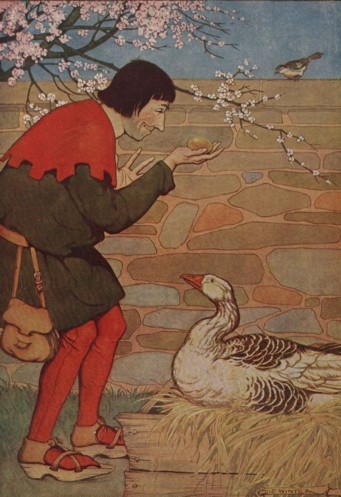PART A_1
Let’s learn vocabulary. Listen and repeat the words and the sentences with your tutor.
PART A_2
| 1. possess | /po-ZES/ |
| -to have or own something | |
| Her family possesses the largest farmland in the province. | |
| 2. nest | /nest/ |
| -a home built by birds for their eggs and by some other creatures to live in | |
| The little bird got injured when he left his mother’s nest. | |
| 3. impatient | /im-PEY-shent/ |
| -wanting something to happen as soon as possible | |
| The creditor grew impatient after her debtor failed to pay her loans for several months. | |
| 4. precious | /PRESH-us/ |
| -rare and very valuable | |
| Her precious car was given to her by her parents on her birthday. | |
| 5. deed | /did/ |
| -an intentional act, especially a very bad or very good one | |
| With her good deeds, she was loved by many. |
PART B_1
Let’s read the story. Please read them aloud, and I will check your pronunciation and intonation.
PART B_2
The Goose and the Golden Egg

There was once a Countryman who possessed the most wonderful Goose you can imagine, for every day when he visited the nest, the Goose had laid a beautiful, glittering, golden egg.
The Countryman took the eggs to market and soon began to get rich. But it was not long before he grew impatient with the Goose because she gave him only a single golden egg a day. He was not getting rich fast enough.
Then one day, after he had finished counting his money, the idea came to him that he could get all the golden eggs at once by killing the Goose and cutting it open. But when the deed was done, not a single golden egg did he find, and his precious Goose was dead.
Those who have plenty want more and so lose all they have.
The Countryman took the eggs to market and soon began to get rich. But it was not long before he grew impatient with the Goose because she gave him only a single golden egg a day. He was not getting rich fast enough.
Then one day, after he had finished counting his money, the idea came to him that he could get all the golden eggs at once by killing the Goose and cutting it open. But when the deed was done, not a single golden egg did he find, and his precious Goose was dead.
Those who have plenty want more and so lose all they have.
PART C_1
Let’s answer comprehension questions. Please answer them based on the story.
PART C_2
| 1. | What benefit did the Countryman get from the goose? |
| 2. | Why did the Countryman decide to cut the goose open? |
| 3. | What happened when such deed was done? |
PART D_1
Let’s discuss the story. Please answer the questions below and express your opinions.
PART D_2
| 1. | What word could be used to describe the Countryman in the story? Please explain your answer. |
| 2. | Why do you think the goose gives just one golden egg per day? |
| 3. | What could have been the proper treatment of the countryman to the goose? |
| 4. | Do you agree with the moral of the story? Why or why not? |
| 5. | Why do you think some people never feel contentment? |
REVIEW AND FEEDBACK
Now, let us review the things that you learned in this lesson.
ではこのレッスンで学んだことを振り返りましょう。
(Please give a short feedback on how your student did on your class.)
| Grammar 文法 |
Pronunciation 発音 | Vocabulary 単語 |
Comprehension 理解 |
|
|---|---|---|---|---|
 GOOD GOOD |
文法の誤りはほとんどなく、完全な文章で話すことができる | ほとんどの単語をはっきりと正しく発音することができる | 習った表現を適切に使うことができる | 文章を理解し、質問に正しく答えることができる |
 FAIR |
文法の誤りはあるが、完全な文章で話すことができる | 発音の練習が必要な言葉がいくつかある | たまにミスはあるが、習った表現を適切に使うことができる | 文章を完全に理解するのは難しく、質問に正しく答えられないときもある |
 POOR |
文章で話すのは難しく、単語だけで話すことができる | 発音の練習が必要である | 習った単語と表現を少しだけ使うことができる | 文章を理解するのは難しく、質問に答えるのは難しい |
Parts of this lesson material are based on:
An eBook from The Project Gutenberg.
This eBook is for the use of anyone anywhere at no cost and with almost no restrictions whatsoever. You may copy it, give it away or re-use it under the terms of the Project Gutenberg License included with this eBook or online at www.gutenberg.org
An eBook from The Project Gutenberg.
This eBook is for the use of anyone anywhere at no cost and with almost no restrictions whatsoever. You may copy it, give it away or re-use it under the terms of the Project Gutenberg License included with this eBook or online at www.gutenberg.org